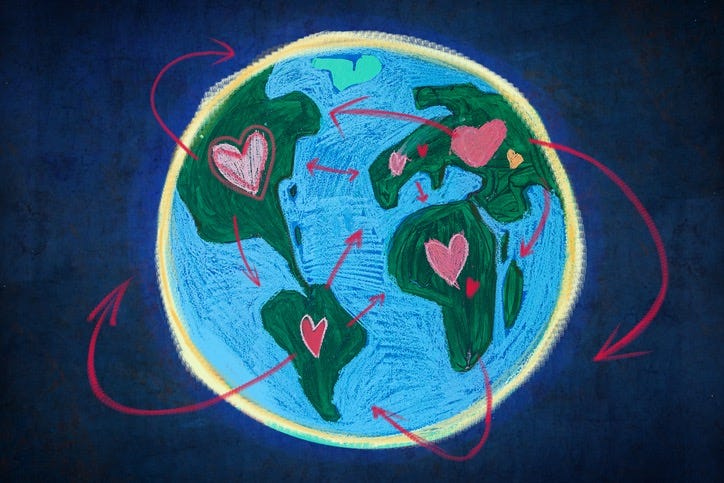Love is Universal
A new study finds the strongest evidence to date that romantic love is a universal human experience.
Turning on the news, it may seem like hate is the predominant force circulating throughout the globe these days. While it may very well be true that hate and conflict is a human universal, new research suggests: so is love.
To date, most studies on romantic love have been conducted on “WEIRD” samples (drawn from Western, Educated, Industrialized, Rich, and Democratic populations). Verena Klein and colleagues found that 68-88% of studies in top sexuality journals were based on WEIRD samples.
This has caused some anthropologists and psychologists to cast doubt that romantic love really is a human universal experience. If you go back early enough, you also see that philosophers such as Foucault denied that love is a universal and in the 1920s and 19302s Polish anthropologist Bronisław Malinowski was skeptical that romantic love was universal arguing instead that sexuality is the dominating universal human drive.
As a corrective, a new study by Piotr Sorokowski and colleagues assessed the intensity of romantic love across nine non-WEIRD cultures:
They measured romantic love using Robert Sternberg’s “Triangular Love Scale”, which conceptualized romantic love as involving three main components: intimacy, passion, and commitment. Here are the items on the scale so you can get a sense of how each component is measured:
The results support the universality of romantic love. The average intensity of love exceeded 75 on a 0-100 scale:
Importantly, across all cultures, individual differences were larger than cultural differences. Also, people reported higher levels of intimacy and commitment compared to passion, though intimacy and commitment din’t differ significantly from each other. I find this finding interesting and important, and we shouldn’t forget that love involves more than just passion (it may be easy to forget this on modern-day dating apps). Commitment and intimacy are also central and essential aspects of the love experience. The researchers also found that older people reported higher love scores than younger people, and no sex differences were found.
These findings suggest that romantic love may have strong biological underpinnings and serve essential evolutionary functions. The late great Helen Fisher (who I miss terribly) has long argued that love is an innate drive, and other researchers have proposed the “love as a commitment device” hypothesis, arguing that romantic love evolved to facilitate human pair-bonding and foster commitment between partners. Of course, cultural and environmental factors such as modernization, individualism-collectivism, and gender equality are also important in sharping romantic love experiences.
Since romantic love such a universal, how can we leverage this drive to create more peace in the world? God knows we need it right now.






What a surprise. Not.
For pretty much my entire life I have had a deeply personal connection with the spiritual unfolding quest. The image of the Lotus is a wonderful metaphor. The question of commitment speaks more to character than love. I see love as something that arises when the conditions are ready. When someone says I love you the usual understanding is that the recipient of the proffered love has met the criteria to be rewarded with love from a person’s love storehouse. I see it as something that arises and stays depending on the skills of nurture that keep love alive. It is like taking care of a garden where plants are the love that arises from the Earth. I have not heard you talk about your metaphysics. I watched you talk with Sam Harris. I assume you know he is one of the four horsemen, the other three being Richard Dawkins, Daniel Dennett, and Christopher Hitchens. I see them as spiritual idiots. I just received my copy of your book Transcend and will be buying a copy of Rise Above. Have you published anything that states your likelihood ratios regarding what it’s all about, Scotty(Alfie?)?